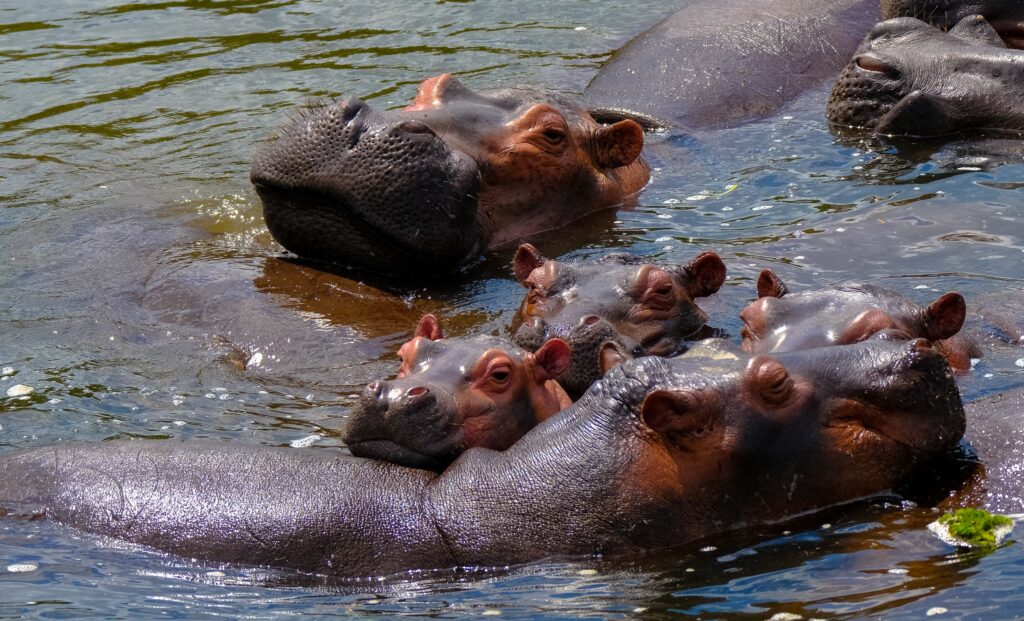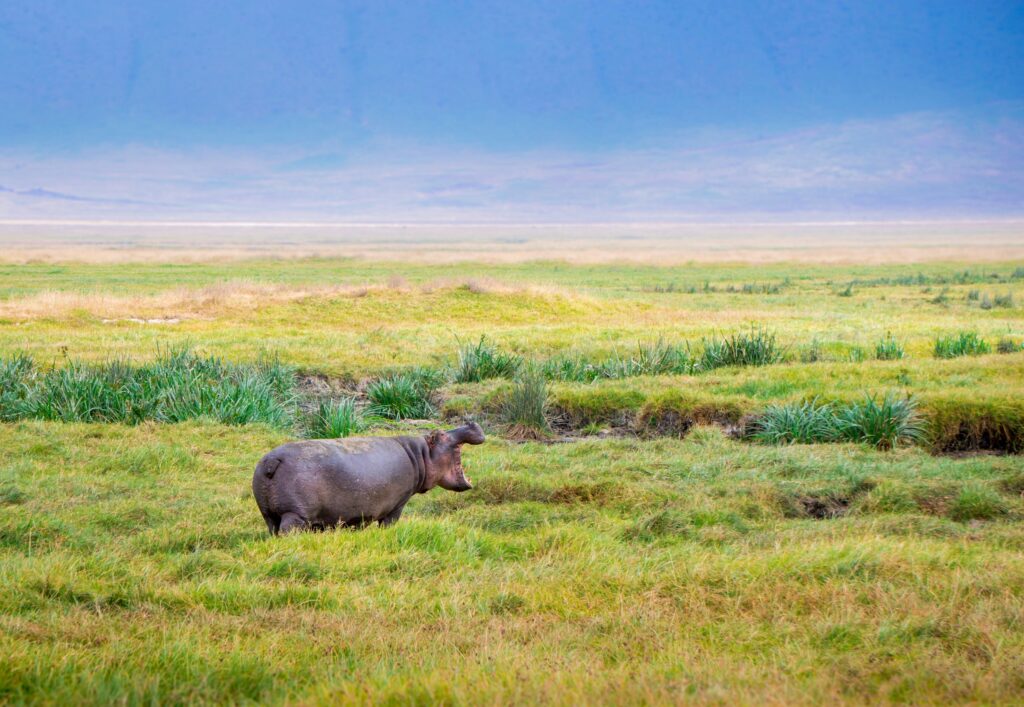If like me your mind creates all kinds of random questions when you are trying to fall asleep, ‘can people eat hippos?’ may be one of the questions that has popped up.
I was recently replaying Assassin’s Creed Origins, being attacked by hippos and it got me wondering – can people eat hippos?
This guide explains if people can eat hippos and some other fun hippopotamus trivia!
A Tasty Treat? Can Humans Eat Hippos?
Yes, people can eat hippos and in some parts of the world they are eaten as a delicacy. With that said, because of conservation efforts it is unethical to eat hippos.
Hippopotami are native to Africa with the following countries having large hippo populations:
- Côte d’Ivoire
- Ghana
- Togo
- Democratic Republic of Congo
- Tanzania
- Zimbabwe
- Rwanda.
In most countries it is ILLEGAL to sell hippo meat and while in the past it was considered socially acceptable, it is a taboo meat to consume in modern society.
Most hippo meat is acquired by hunting (read further down for a fun hippo farming fact).
For millennia, humans and hippos have had an uneasy existence alongside each other, and hippos have given as good as they got. Hippopotami are dangerous and aggressive animals, and they frequently attack humans. Hippos even killed some Ancient Egyptian pharaohs.
Most hippo hunting is for trophies, but occasionally hunters will use all of the animal they have killed including eating the meat.
Can People Eat Hippos – What Does Hippo Taste Like?
The most consumed type of hippo meat is the steak cuts you would associate with beef.
According to people who have eaten hippo meat it’s similar to beef as well with a full flavour and firm texture – similar to a sirloin steak or rump steak.
Hippo meat also has a slight pork flavour with sweet notes you wouldn’t associate with beef. Despite this slight sweetness, the meat is not considered gamey.
Regardless of the flavour – you should NOT eat hippo meat because the species is vulnerable.
Can People Eat Hippos – Aren’t Hippos Endangered?

Large hippos are vulnerable and pygmy hippos are endangered.
In some countries it is illegal to hunt hippos as a result of this vulnerability. Uganda for example has made it illegal to hunt hippos.
There are currently two species of hippo – the large hippo and the pygmy hippo.
The large hippo is the most familiar type of hippo and currently has a population estimated to be between 115,000 and 130,000.
The pygmy hippo as the name suggests is a smaller hippo and the wild population of the pygmy hippo is very low with an estimated 2,500 in the wild.
Because pygmy hippos have such a low wild population there are ongoing conservation efforts to try and prevent extinction.
What Are the Conservation Efforts for Hippopotami?
Conservation of the large hippo is ongoing and is proving difficult due to several factors:
- Large Hippopotami are both pestiferous and aggressive. They will raid farmland and attack humans with no provocation. This has lead to unfavourable public opinion of large hippos and some countries actively encourage hunting them.
- Hippo poaching is common because as I have learned researching this article, people want to eat them as well as use their ivory.
- Hippos are aggressive to other animals and can cause conflict with other conservation efforts.
To combat Hippo decline, various African governments have taken action to protect hippos and prosecute poachers. There are also a few hippo sanctuaries in Africa to help isolate hippos and increase their numbers.
Conservation of the Pygmy Hippo
Pygmy hippos are less aggressive than their larger counterparts but unfortunately, they are considered twice as delicious by people who eat hippopotami.
Whilst it’s illegal to hunt Pygmy hippos in Liberia there is a huge demand for Pygmy hippo meat which has caused an expanding black market.
There are so few Pygmy hippos remaining that it is thought they will go extinct in the wild within the next 100 years.
The reasons for their dwindling numbers are:
- Deforestation for timber (depriving Pygmy hippos of their natural habitat),
- Poaching for meat,
- Civil war in countries where the Pygmy Hippo lives,
- Lack of Pygmy Hippos mating in the wild,
- Predation from other animals such as leopards, pythons, and crocodiles.
It is unknown how much each factor impacts the Pygmy Hippo population and there is concern that they will die out regardless of negative human action because other animals commonly hunt and eat Pygmy Hippos.
How Human Conservation is Having a Positive Impact on Pygmy Hippos
When kept in captivity, Pygmy Hippos live lengthy and healthy lives with life expectancy being much higher than wild Pygmy Hippos.
To give you an idea on life expectancy, a Pygmy Hippo will live for around 55 years in captivity which is estimated to be 42 years longer than a wild Pygmy Hippo (which has an estimated life expectancy of 13).
Why Conservation Might Not Save Pygmy Hippos
Even in captivity though there are issues with conservation as the male population of Pygmy Hippos has been in decline. This has lead conservationists to observe a poor sex ratio (41% male to 59%) in captivity.
Conservationists are unsure if this sex ratio is also a factor in falling wild populations as well.
Lastly, there have been other species of small or pygmy hippopotami that have already become extinct during the Pliocene period when Homo-Sapiens (Modern Humans) weren’t a contributory factor. It may well be Pygmy Hippos aren’t equipped to cope with the world as it is now.

Weird Hippopotami Facts
I hate to leave the sad plight of the Pygmy Hippo behind, but I am sure the best people in their respective fields are working hard to prevent further decline of their population.
Hippopotami have some bizarre facts that you just might find interesting.
Hippos Actively Engage and Kill Crocodiles
Aside from poaching, the African crocodile is killed most by Hippos. Both animals live on land and in the water and it seems the two come into conflict frequently.
Sometimes a Hippo will attack a crocodile to protect young Hippos, but a Hippo is equally as likely to attack out of aggression.
Despite attacking and killing crocodiles, Hippos don’t eat crocodiles and are purely herbivorous. Whereas crocodiles will prey on hippos if given the chance.
This natural aggression hippos display may well be a defensive tactic to prevent predation. It is noteworthy that the Nile Crocodile is also an extremely aggressive animal so Hippos might have opted to fight fire with fire.
The US Government Wanted to Create Hippo Farms
I mentioned Hippo farming earlier in my article and here is a completely wild fact about just that. At the turn of the last century (1910), meat supply in the US was low and the Congress decided to combat this they would import hippos from Africa and keep them on ranches.
The plan was fully costed but upon further consideration Congress decided it would be more prudent and inexpensive to reclaim swamplands and graze cattle instead.
But, in an alternate reality, there will be cowboys and ‘hippoboys’ rounding up their herds.
Columbia Has a Small Wild Hippo Population
From the North American continent to South America. Columbia has a wild population of Hippos thanks to Pablo Escobar.
The infamous drug lord imported and kept four hippos as pets. When he was killed the hippos were released into the wild and today it is estimated that group of four hippos has flourished to a steady population of 70.
Bizarrely, despite their success in the wild, this population is already under threat from criminals who capture the new-born calves and sell them on as pets. Because of Escobar’s reputation, these calves are seen as status symbols and are highly coveted.
Conclusion to Can People Eat Hippos?
The answer you originally sought is unfortunately people do eat hippos.
Ongoing efforts are being made to conserve both Large Hippos and Pygmy Hippos and hopefully in time people will realise eating them is not a good idea.
Hopefully you have also learned a lot more about hippopotami as a result of your curiosity!
